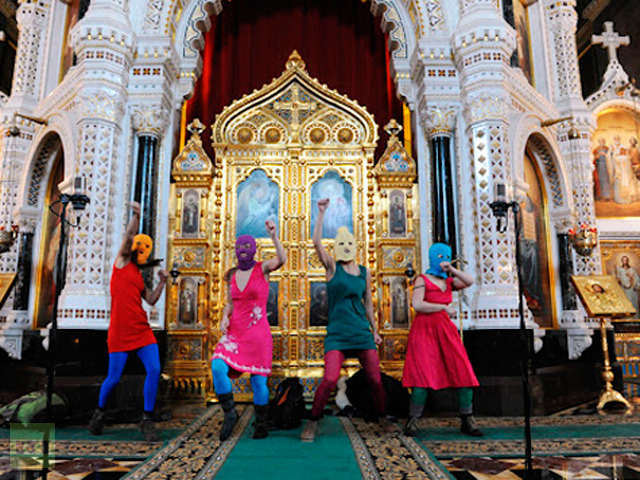Title: Pussy Riot: A Punk Prayer
Directors: Mike Lerner and Maxim Pozdorovkin
They bear the puckish name of an American liberal arts college group, and their air-quote music — blasts of awkwardly rhymed social complaint that makes Liam Lynch’s “United States of Whatever” sound like a delicate Shakespearean sonnet — is quite honestly dismissible at best, so it’s something of an unlikely surprise that Pussy Riot has achieved the notoriety they have. Formed in 2011 after Vladimir Putin was nominated for a third term as Russian president, this controversial, anonymous feminist art collective took issue with what they deem the excessive nationalism Putin promotes, and well as the various rollbacks in freedoms and general church-sanctioned patriarchy over which he has presided. A series of public performance-art style protests came to a head on February 12, 2012, when masked members of the group jumped up on the altar of Moscow’s Cathedral of Christ the Savior, a place sacred to Orthodox Christians, for a 40-second blast of punk music. Arrests and international hot-button status ensued.
The new HBO documentary “Pussy Riot: A Punk Prayer,” then, attempts to peel back a bit of the hype and present the facts of the case, following the trial of Nadia Tolokonnikova, Masha Alyokhina and Katia Samutsevich — each of whom face seven years in prison on charges of “disrupting social order by an act of hooliganism that shows religious hatred.” Directors Mike Lerner and Maxim Pozdorovkin intercut interviews with the participants, their parents and other figures with courtroom footage and other TV clips that showcase a certain lit fuse of fundamentalist fervor in the country.
The film doesn’t evidence much of a unifying technical aesthetic, but — bolstered as it is by a nice array of performance clips and ancillary protest footage — there is a certain grungy-chic quality to it. There’s a pinch of history herein too (the church in question was torn down in 1931 under Josef Stalin, and only rebuilt in the early 1990s, after the collapse of the Soviet Union), but while dissenting viewpoints are roundly tolerated, “A Punk Prayer” doesn’t really endeavor to delve deeply into the insecurity and offense of fundamentalists. (Then again, maybe it’s a matter of the articulateness, or lack thereof, of the subjects to which it does grant time; one elderly protester compares the Pussy Riot performance to “taking a shit in your apartment.”)
Part of this disconnect and agitation surely relates to there existing no real point of collective reference in the former Soviet Union for performance art or punk music. To many, Pussy Riot seem to come across as a half-step removed from mouth-foaming aliens, so their message of freedom of speech and broader political participation is drowned out by the clamorous means of their expression. A couple figures, including a somewhat sympathetic-sounding prosecutor, seem to grasp this. But, paradoxically, in largely tightening its focus to the women and some of their immediate family, Lerner and Pozdorovkin fail to fully explore the both Russian and international resonance of their message, by way of the protests and counter-protests the trial spawned. Ergo, while interesting throughout, “A Punk Prayer” seems like a bit of a missed opportunity, insofar as its connection to the personal freedoms Westerners so cherish and speechify about.
NOTE: “Pussy Riot: A Punk Prayer” plays on HBO and its sister stations throughout the summer. Check your local listings for showtimes.
Technical: C+
Story: B
Overall: B-
Written by: Brent Simon

